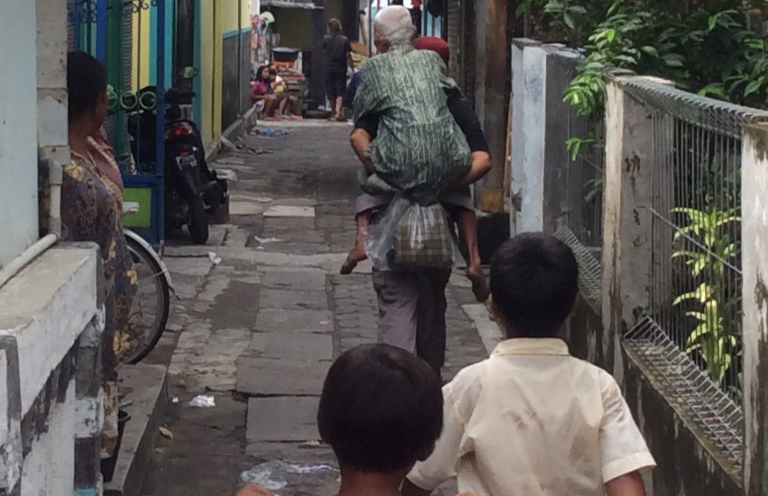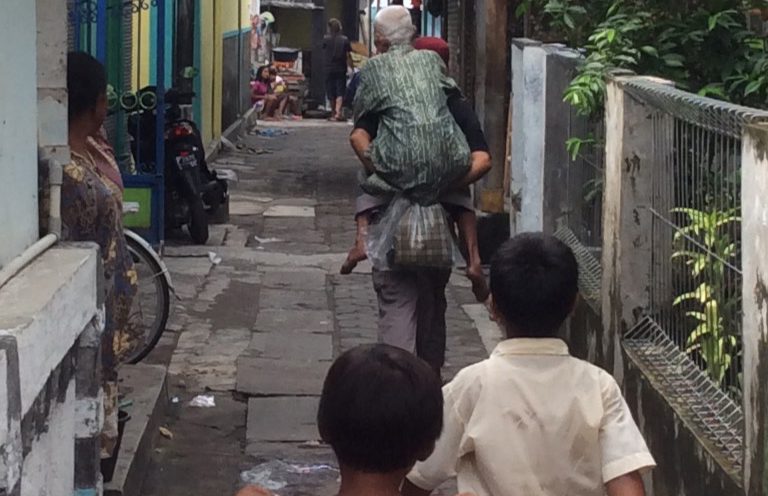
A son carries his 92-year-old father with dementia home after he is released from a camp for the vulnerable. Photo: Sandeep Nanwani.
Indonesia’s most vulnerable are being failed by policies that criminalise begging, busking and homelessness. Even more dangerously, these policies are informed by an ideology of self-help that shifts the burden of care onto families that are mostly unable or unwilling to do so. Benjamin Hegarty reports.
As the widely reported LGBT media storm rumbled on through the first half of 2016 in Indonesia, my attention was grabbed by news from Yogyakarta, where I conducted fieldwork last year.
On 27 March five waria (male-to-female transgender) friends, as well as a number of others, were taken into custody by the Municipal Police (known as Satuan Polisi Pamong Praja or Satpol PP). The arrests took place at the Sunday Morning (popularly referred to as Sunmor) market at the Gadjah Madah University campus.
The market is known as a safe space for waria to do some busking (ngamen), and is popular among students and others to hang out, exercise, shop and relax in a rare green space. Jogjakarta is a city undergoing rapid development and parks are rare.
Although waria have indeed suffered from the unusual viciousness of attacks on LGBT, the arrests at Sunmor have nothing to do with it. In fact, the arrests form part of a longer transformation in forms of state welfare over the past two years.
These and other raids, known as “sweeps” (nyapu), are often first contact with an emergent system of state care and provision of social welfare. According to the waria, they and others taken were not busking at the time they were arrested, suggesting that the police are looking for those who fit a particular profile. This policy thus not only affects waria, but anyone who appears to require assistance from the state.
Decentralised laws target visible symbols of poverty first
Since the beginning of 2015 many hundreds of people have been incarcerated – those found busking, begging or to be homeless. Penalties are severe and include jail time, large fines or both. In the province of Yogyakarta, the law is called Peraturan Daerah Gelandangan dan Pengemis (abbreviated to Perda Gepeng).
Although signed into law by the Yogyakarta Governor on the 27 February 2014, it began to be enforced from January 2015. The law supplements existing practices of raids (on anti-social behavior such as drinking homemade liquor and sex work) with new behaviour deemed not necessarily immoral or even criminal, but rather considered to be a plea for help.
In order to fulfil the law’s aim to “protect and enrich the welfare of each citizen and protect groups within society who are at risk [rentan]” police conduct raids frequently, particularly during major holidays. They take those arrested to what is called “camp assessment” for a range of assessments: on their mental health, their residency status in the city that they are caught, and most importantly their “potential” [potensi] to become “productive” [produktif] citizens.
Those diagnosed by camp staff to have a mental illness are described as “non-produktif”. They are usually administered anti-psychotic drugs or sedatives and rarely see a psychiatrist. Some of those with a mental illness are reported to have spent long periods in the camp before they are shifted to one of the region’s limited psychiatric facilities.
On the other hand, those considered potentially “produktif”, such as those caught busking or begging, are assessed to see how such productivity might be better enhanced. Camp staff describe them as occupying a “zona aman” (zone of safety) for too long, and that they need to exit this zone in order to be “mandiri” (independent) economically.
Abandoned to family
While Perda Gepeng may on the surface appear a violent state retribution towards the poor, it is actually part of a much more pervasive set of ideas. In particular, a relationship between the family and care, coupled with ideals of independence and self-help are shaping broader social and cultural attitudes towards state welfare.
Those who are from outside of the city are returned to their city of origin, forcibly if need be. Those from the province of Yogyakarta are returned to their families, most of whom lacked the capacity to care for the person in the first place. Those without a family are released with guarantees from various NGOs.
Currently, people are released from the camp’s temporary zona aman and taken back to families. It is important to note here that it is all kinds of people who are affected: the elderly, those with dementia, young children, adolescents with learning difficulties and people experiencing psychotic episodes.
The family then, becomes an alternate – but equally temporary – zone of safety. Many families are limited in their capacity to provide any care at all to members. Furthermore, despite the belief that all people can somehow become “productive” and “independent” with enough effort, the way that the family acts as a place of return indicates the practical problems with such ideals.
Harm and care
Most striking is the way in which those administering such policies – psychologists, doctors, nurses, state bureaucrats – believe in their own rhetoric. During fieldwork, dedicated professionals mentioned to me the many problems and their desire to help. Indonesian society wants concerted action on inequality.
Indeed, the Indonesian state has recently sought to challenge existing attitudes towards mental health by way of campaigns on pasung, or forms of illegal incarceration of those with a mental illness often by family members. Yet, the system encouraged by the implementation of Perda Gepeng may just be creating new forms of state incarceration that provides a revolving door back to family pasung.
In this current context many Indonesians could potentially face the fate of my waria friends arrested at the Sunmor market — cut adrift from family and society and demanding state help but receiving in its place empty platitudes about self-help.
In the current economic climate Indonesians cannot be expected to rely only on themselves and their families. Approximately 400 people are currently in Jogjakarta’s Department of Social Services camp for “assessment” which has an official capacity of 150. Half of those have been diagnosed with some form of mental illness. The mayor of Surabaya claimed that there are 1,500 “crazy people” [orang gila] in a similar municipal institution there.
The waria taken to camp on 27 March spent five nights there before being released as the result of intensive efforts by activist groups and NGOs. When they reflected on their time in the camp they said that they had learned that they are not the worst off in society; that there are many people they saw in the camp that are in positions of abject poverty and abandonment.
The fact that the camp acts as a clearing house for a vast array of people suggests complex social problems compounded by severe economic vulnerability. Demands that such people leave zones of safety for a life of independence fails to acknowledge the many difficulties beyond their control.
Furthermore, such demands risk compounding the vulnerability of those who need help the most.
Benjamin Hegarty is a PhD candidate in anthropology at the Australian National University.
Acknowledgement
Sandeep Nanwani supplied some of the information in this article and is actively involved in caring for people affected by Perda Gepeng. He is a graduate of the Gadjah Madah University Faculty of Medicine and is commencing a Master of Medical Sciences in Global Health Delivery (MMSc-GHD) as a Fulbright Scholarship recipient at Harvard University this July.
 Facebook
Facebook  Twitter
Twitter  Soundcloud
Soundcloud  Youtube
Youtube  Rss
Rss 